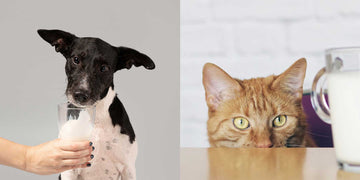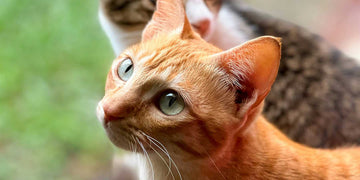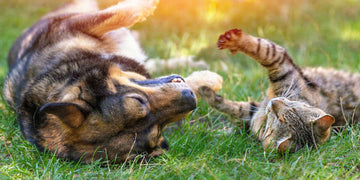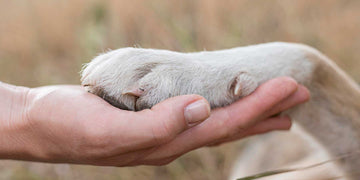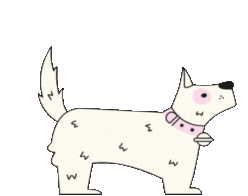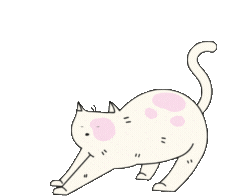The Truth About Dairy: Is Milk Really Good for Your Dog or Cat?
For generations, images of kittens lapping up saucers of milk or puppies happily slurping from a bowl have been a common sight in popular culture. This widespread imagery has led many pet parents to believe that milk is a natural and beneficial treat for their furry companions. But is this really the truth about dairy for pets? Let's dive into the science.
Lactose Intolerance in Pets: The Root of the Problem
Just like many humans, the vast majority of adult dogs and cats are lactose intolerant. Here's why:
-
Puppies and Kittens: When young, puppies and kittens produce an enzyme called lactase. This enzyme is crucial for breaking down lactose, the sugar found in milk, allowing them to digest their mother's milk efficiently.
-
Growing Up, Enzymes Go Down: As they mature and are weaned off their mother's milk, their bodies naturally produce less and less lactase. By adulthood, most dogs and cats produce very little, if any, of this enzyme.
-
Undigested Lactose: Without lactase, the lactose in cow's milk passes undigested through their digestive system. This undigested sugar then draws water into the intestines and ferments, leading to a host of unpleasant symptoms. This is why milk is bad for dogs and milk is bad for cats once they are adults.
Common Signs of Milk: Related Digestive Upset in Pets
If your pet consumes milk and is lactose intolerant, you might observe one or more of these signs:
-
Diarrhea: This is one of the most common symptoms as the undigested lactose irritates the bowels.
-
Vomiting: Your pet's stomach may reject the indigestible milk.
-
Abdominal Pain/Cramping: You might notice your pet seems uncomfortable or has a distended belly.
-
Gas/Flatulence: Fermentation of lactose in the gut produces gas, leading to bloating and flatulence.
-
Loss of Appetite: Discomfort can lead to a temporary aversion to food.
Even small amounts of milk can trigger these symptoms in highly sensitive pets, highlighting why dairy for pets is generally not recommended.
Beyond Lactose: Other Considerations for Dairy and Pet Health
While lactose intolerance in pets is the primary issue, there are other reasons why cow's milk isn't ideal for pets:
-
Fat Content: Cow's milk can be relatively high in fat, and regular consumption can contribute to weight gain and even pancreatitis (inflammation of the pancreas) in some susceptible animals.
-
Allergies: While less common than lactose intolerance, some pets can also be allergic to the proteins in cow's milk, leading to skin issues, itching, or more severe digestive upset.
-
Nutritional Imbalance: Cow's milk is not a complete and balanced food for pets. Filling them up with milk can displace more nutritionally appropriate calories from their regular, balanced diet, potentially leading to deficiencies.
Why It’s Time to Rethink Dairy: For Ourselves and Our Pets
Dairy has long held a revered place in many cultures, especially in India. From daily chai to festive sweets, it’s everywhere. But behind this staple lies a far-reaching environmental and ethical cost that many are only beginning to understand. It’s time we stop thinking of dairy as harmless. Whether for you or your pet, ditching dairy is a meaningful step toward living gently with the earth, with animals, and with our values. Choosing dairy-free pet food aligns with a more compassionate lifestyle.
Sustainable & Kind Alternatives to Dairy for Pets
Luckily, both humans and animals can thrive without dairy. The market now offers numerous plant-based pet alternatives and dairy-free pet treats:
-
Plant-based milks: Coconut, oat, and soy (always ensure no xylitol or other harmful additives for pets). These can be a nice, safe treat in moderation.
-
Dairy-free pet treats: Many brands offer vegan chews and cookies specifically formulated without milk or other animal by-products.
-
Complete vegan pet foods: These specially formulated diets skip dairy altogether and are fortified with all essential nutrients your pet needs for optimal health.
These products not only reduce harm but are also gentler on digestion and the environment. Make the healthiest and most compassionate choice for your beloved companion. Explore our range of plant-based pet foods and treats; no dairy needed!
Sources & Suggested Reading:
-
FAO (2023), “Dairy’s Climate Impact”
-
Down to Earth Magazine, “India’s Dairy Dilemma” (2022)
-
Humane Society International India Reports
-
Journal of Dairy Science, Vol. 103 (2020)
Do you have a dairy-free success story to share? Send it in - we’d love to feature your journey on Real Pet Parents Reviews!
